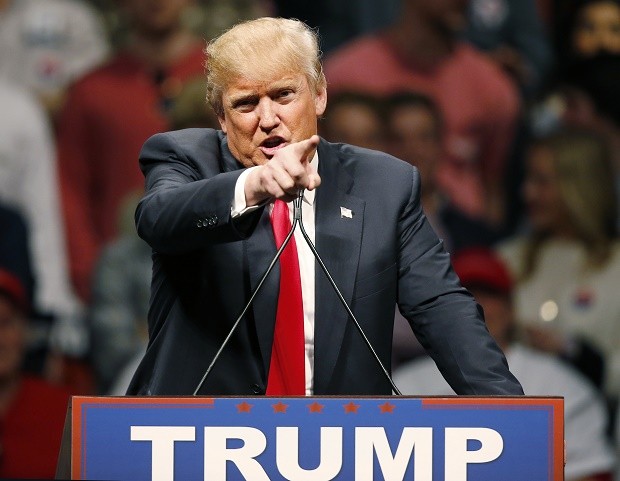
Republican presidential candidate Donald Trump gestures during a speech at a rally in Oklahoma City. AP File Photo
WASHINGTON — Republicans debate again Thursday night as party leaders agonize over how to stop the candidacy of tough-talking New York billionaire Donald Trump ahead of critical primary votes in Florida and Ohio on Tuesday.
Democrats Hillary Clinton and Bernie Sanders tangled in their latest debate Wednesday night over immigration, a key issue for Florida’s large Hispanic population.
Tuesday’s outcome could give both Clinton and Trump virtually unbeatable leads in the delegate count as both major political parties move toward national nominating conventions this summer.
Trump has been popular with Republican primary voters but is feared unelectable in the November general election because of his off-color language, his proposal to build a wall along the Mexican border and his denigration of Hispanics, Muslims and women.
In his latest blast, Trump on Wednesday night told CNN that “I think Islam hates us.”
“There’s a tremendous hatred,” he added. “We have to get to the bottom of it. There is an unbelievable hatred of us.”
Trump has said he would temporarily ban non-citizen Muslims from entering the country.
Trump’s candidacy has left Republican officials with the uncomfortable idea that their second least favorite presidential candidate, ultra-conservative Texas Sen. Ted Cruz, may be the party’s best last chance to stop him.
Possible Cruz supporters include reluctant Senate colleagues and former presidential rivals with strong ties to major donors, who have feared Cruz’s purist ideology but dread a Trump nomination even more.
Cruz on Wednesday announced the backing of one former primary opponent, Carly Fiorina, and is seeking the backing of another, Jeb Bush, on Thursday.
“It’s an outsider year, and the most logical person to take on Trump based on past performance is Ted Cruz,” said another former presidential opponent, South Carolina Sen. Lindsey Graham. Earlier in the year, Graham likened the choice between Cruz and Trump to “being shot or poisoned.”
“He’s not my preference,” Graham said of Cruz. “But we are where we are. And if Trump wins Florida and Ohio, I don’t know if we can stop him.”
In their Wednesday night debate, Clinton and Sanders found agreement in seeing Trump as worse on immigration than either of them. “We do not, as Donald Trump and others have done, resort to racism and xenophobia and bigotry,” Sanders said.
Trump has promised to deport all of the estimated 11 million people in the country illegally.
Clinton faulted Sanders for repeatedly voting against a 2007 comprehensive immigration reform bill. He criticized her for opposing a 2007 effort to allow people who were in the country illegally to obtain driver’s licenses.
Had the immigration package passed back then, Clinton said, “a lot of the issues we are still discussing today would be in the rearview mirror.”
Sanders retorted that he opposed the legislation because it included a guest worker program “akin to slavery.”
Florida is home to nearly 1.8 million Hispanics, including about 15 percent of the state’s Democrats. Clinton has been getting about two-thirds of Hispanic votes so far.
Sanders’s long-shot candidacy remained alive after his upset this week in the industrial state of Michigan, where polls had showed him trailing by as much as 20 percentage points.
But in primaries and caucuses so far, Clinton has won 762 pledged delegates compared to 549 for Sanders, with 10 delegates from recent primaries still to be allocated. When superdelegates are included, Clinton leads 1,223 to 574, more than halfway to the 2,383 needed to win the Democratic nomination. Superdelegates are party and elected officials who can vote for any candidate.
In the Republican race for delegates, Trump has 458 and Cruz has 359. Florida Sen. Marco Rubio has 151 delegates and Kasich has 54. It takes 1,237 delegates to win the Republican nomination for president.
Rubio, the favorite of the party mainstream, has faded after he briefly adopted Trump’s insulting debate style. He trails Trump in his home state, Florida. TVJ